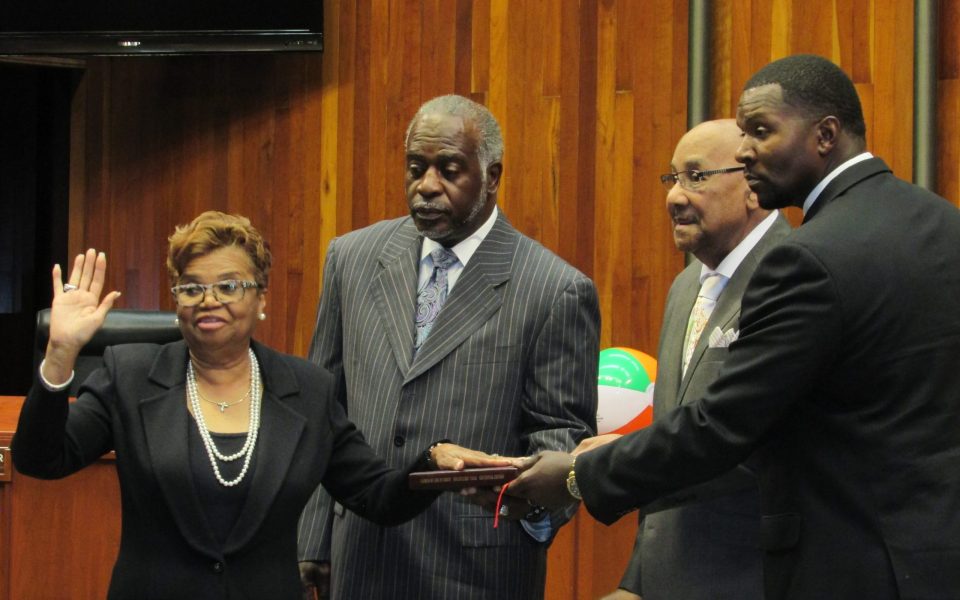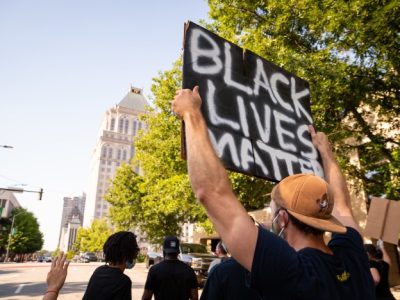The new Greensboro Municipal Federal Credit Union branch at Renaissance Shops sits snugly between the Family Dollar and a vacant storefront that looks newly renovated and ready to lease.
With fieldstone trim, clean and ample sidewalks and tastefully varied awnings in the shopping center, the credit union branch presents customers with a somewhat jarring experience. Once they step through the front doors they’ll find themselves in a vestibule, passing under a horseshoe-shaped metal detector, and then they’ll wait for an employee to buzz them into the lobby.
The community in northeast Greensboro has pinned its collective hopes on the shopping center, and the city has made a significant investment to match, from McGirt-Horton Branch Library fronting onto Phillips Avenue to underwriting Renaissance Community Co-op. Depending on one’s perspective, the security arrangements at the credit union either represent a wise insurance policy on a fragile community investment, or a self-sabotaging reinforcement of negative perceptions about commercial real estate that serves the needs of African-American residents.
Irving Allen, an organizer with Black Lives Matter, leans toward the latter view.
Noting that the credit union could potentially serve both middle-class residents of King’s Forest and the Claremont Courts public housing community, Allen said the basis of sound economic development should be “treating people fairly.”
He added, “No matter what you’re doing, that should be where you start. I don’t think that’s a very good display of believing in the community and wanting to invest there. It’s almost kind of like they made that a requirement to operate in the community as opposed to earnestly wanting to invest in the community. If that’s the case, we need to have a conversation about whether that’s the investment we want in our community.”
Allen questioned whether the credit union is treating its customers in predominantly black east Greensboro the same as financial consumers from the majority-white west side.
The credit union’s presence in Greensboro doesn’t break down neatly along an east-west axis. The Renaissance Shops branch represents its first foray into east Greensboro, while the two pre-existing branches are in downtown and the south side. Allen told me the downtown branch doesn’t require customers to go through a metal detector. I confirmed that the second location on Soabar Street is likewise not outfitted with a metal detector.
The demographics of the Renaissance Shops and Soabar Street locations are somewhat different: Although both are in majority black areas, the former is more racially segregated and further down the income scale. Another important distinction is that the new branch at Renaissance Shops will draw from a residential base, while the Soabar Street location caters to city employees who commute into the area. The Soabar Street branch is located across the street from the Greensboro Water Resources Operation Center. The Greensboro Transit Administration Operations/Maintenance Center, Greensboro Fire Station 11 and the Greensboro Police Department Patrol District 2 Station are all located within a half-mile radius.
[pullquote]Councilwoman Goldie Wells hosts a District 2 town-hall meeting tonight from 6:30 to 8:30 p.m. in the auditorium of the Union Square campus, located at 124 E. Gate City Blvd. in Greensboro.[/pullquote]Greensboro Municipal Federal Credit Union didn’t return my calls, so it’s hard to guess exactly what public safety measures they relied on, if any, to determine that a metal detector was a necessary security feature for the Renaissance Shops branch. A spokesperson for Self-Help, the nonprofit that owns the property, told me the shopping center “hasn’t had any safety issues,” adding that “we respect that each tenant has unique needs associated with their business.”
Councilwoman Goldie Wells, who represents District 2 on city council, bristled at the notion anyone would question the decision.
“It was a lot of negotiation to get a bank over here,” she said. “I’m pleased that they came. I’m pleased that they’re using safety measures so that we don’t add to negative statistics.”
During a brief and fraught interview, Wells seemed to regard the question of whether crime statistics back up the need for a metal detector in the credit union branch as willfully naïve, while suggesting the data for the district as a whole — which covers the northeastern quadrant of the city — should be a sufficient gauge.
“We’re not like the other districts,” Wells told me, citing District 2’s disproportionate share of homicides.
Allen indicated he plans to raise the security features at the new credit union branch at a District 2 town hall hosted by Wells at the Union Square campus at 6:30 p.m. tonight. The meeting is billed as an opportunity “for District 2 residents to meet their representative and share thoughts about the future for a stronger district and a stronger Greensboro.”
Wells, in turn, said her bandwidth for debate on the matter will be limited.
“This is not for — I want to hear the thoughts for the community — when we’re making great strides forward,” Wells said, “I don’t want to hear a lot of negative for the things that we fight — no, not fight — negotiate for here.”
Join the First Amendment Society, a membership that goes directly to funding TCB‘s newsroom.
We believe that reporting can save the world.
The TCB First Amendment Society recognizes the vital role of a free, unfettered press with a bundling of local experiences designed to build community, and unique engagements with our newsroom that will help you understand, and shape, local journalism’s critical role in uplifting the people in our cities.
All revenue goes directly into the newsroom as reporters’ salaries and freelance commissions.





Leave a Reply